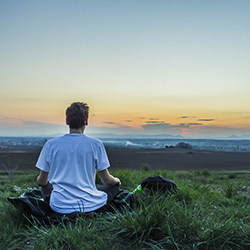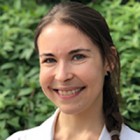 “Qigong” translates from Chinese to mean, roughly, to cultivate or enhance the inherent functional (energetic) essence of the human being. It is considered to be the contemporary offspring of some of the most ancient (before recorded history) healing and medical practices of Asia. Qi Gong is an assortment of dynamic exercises that combines body, mind and spirit to enhance energy circulation and production in the body. It combines repetitive, fluid and intentioned motions with conscious breathing and an attempt to quiet the mind. It seeks to place a person in a state of peace and serenity where one can remain mindful and aware of one’s body and state of being, while also remaining active and present in a meditative state.
“Qigong” translates from Chinese to mean, roughly, to cultivate or enhance the inherent functional (energetic) essence of the human being. It is considered to be the contemporary offspring of some of the most ancient (before recorded history) healing and medical practices of Asia. Qi Gong is an assortment of dynamic exercises that combines body, mind and spirit to enhance energy circulation and production in the body. It combines repetitive, fluid and intentioned motions with conscious breathing and an attempt to quiet the mind. It seeks to place a person in a state of peace and serenity where one can remain mindful and aware of one’s body and state of being, while also remaining active and present in a meditative state.
Qi Gong uses gentle movements, deep breathing and a meditative state of mind to keep vital energy, or Qi, flowing throughout the body. Disease and symptoms are a sign that Qi has become obstructed. Qi Gong focuses on clearing these blockages and allowing energy to flow again naturally. It can include sitting or standing meditation postures as well as either gentle or vigorous body shaking. Medical Qi Gong is also a much larger part of Traditional Chinese Medicine than many people realize, and is often under utilized in Western countries.
Qi Gong has many benefits and advantages. According to the article A Comprehensive Review of Health Benefits of Qigong and Tai Chi, “The combination of self-awareness with self-correction of the posture and movement of the body, the flow of breath, and stilling of the mind, are thought to comprise a state which activates the natural self-regulatory (self-healing) capacity.” A key idea behind the practice is that any form of Qi Gong has an effect on the cultivation of balance and harmony, positively influencing the human energy complex (Qi meridians/pathways) which functions as a holistic, coherent and mutually interactive system. In the above stated article, a study found that regular Qi Gong and tai chi practice produced benefits in the participant’s bone density, cardiopulmonary systems, physical function, reduction in falls, increased balance and quality of life, improved psychological symptoms, and enhanced immune- and inflammation-related responses. The benefits are vast and holistic for the entire body.
The most important thing to remember with Qi Gong is that it takes time and practice for the advantages and benefits to fully manifest. A person’s success is based on cumulative practice that develops over time, and mastery cannot be achieved with just a few hours of practice. It should be incorporated into a person’s lifestyle and become a daily habit for the full benefits to take effect. It takes discipline, willpower and commitment, just like any other exercise program.
One thing that is often emphasized by Qi Gong teachers is the need to allow the internal Qi to guide the movements, rather than one’s own muscles. Attention should be given and intention made to summon Qi from the region below the umbilicus, known as the ‘dantien’, when performing movements. It is not the simple repetition of muscle movements that impel the movements, but rather the deep, vital energy of the body surfacing and taking control of the body movements. This is a difficult concept for many, and one that requires repeated exposure and practice to master, but something that is well worth the commitment. The added benefit of Qi Gong is that it will increase your willpower, so the more you practice the easier it gets.
Many healthcare practitioners consider Qi Gong a highly worthwhile intervention that should continue to be emphasized in clinical practice and as a part of daily life. I feel lucky to have been exposed to it as a practitioner and I hope to learn ways to help incorporate it into the lives of my patients, while also making it an essential part of my daily existence.
Check out this article for more on Qi Gong, and join Anniina February 20 at 7pm at the South Lamar location of Peoples Rx to learn about Qi Gong.
 Anniina Gregg is a licensed acupuncturist (L.Ac.) and a certified herbalist and Oriental Medicine practitioner (NCCAOM). She specializes in healthy aging, digestive and fertility support, and restorative and rejuvenating therapies for stress and fatigue. Her unique style cultivates and encourages patients to find new balance and improved states of physical and mental health.
Anniina Gregg is a licensed acupuncturist (L.Ac.) and a certified herbalist and Oriental Medicine practitioner (NCCAOM). She specializes in healthy aging, digestive and fertility support, and restorative and rejuvenating therapies for stress and fatigue. Her unique style cultivates and encourages patients to find new balance and improved states of physical and mental health.
